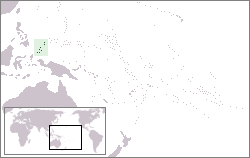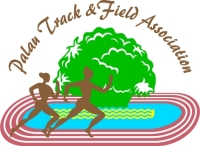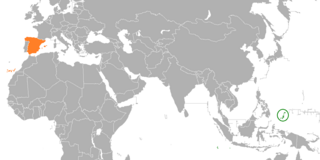 | |
 | |
| Location | Koror, Palau |
|---|---|
| Coordinates | 7°20′36.0″N134°28′05.5″E / 7.343333°N 134.468194°E |
| Type | cultural center |
The Ngarachamayong Culture Center is a cultural center in Koror, Palau.
 | |
 | |
| Location | Koror, Palau |
|---|---|
| Coordinates | 7°20′36.0″N134°28′05.5″E / 7.343333°N 134.468194°E |
| Type | cultural center |
The Ngarachamayong Culture Center is a cultural center in Koror, Palau.
The idea for the establishment of the cultural center originated when a group of visionary women held a special meeting to discuss ways of preserving the culture and tradition of the Palauan people. The meeting led to the establishment of a series of Mechesil Belau Conferences. During these conferences the idea to establish a cultural center was born. Subsequently, the Ngarachamayong, Inc. was incorporated. The cultural center was then constructed with funding from the Government of Palau and the Government of the Republic of China. [1]
The cultural center exhibits the people and culture of the Palauan people. [1] It also regularly hosts musical events. [2]

Palau, officially the Republic of Palau, is an island country in the Micronesia subregion of Oceania in the western Pacific. The republic consists of approximately 340 islands and connects the western chain of the Caroline Islands with parts of the Federated States of Micronesia. It has a total area of 466 square kilometers (180 sq mi), making it one of the smallest countries in the world. The most populous island is Koror, home to the country's most populous city of the same name. The capital Ngerulmud is located on the largest island of Babeldaob, in Melekeok State. Palau shares maritime boundaries with international waters to the north, the Federated States of Micronesia to the east, Indonesia to the south, and the Philippines to the northwest.

Palau was initially settled around 1000 BC.

"Belau rekid" is the national anthem of Palau. Officially adopted in 1981, the music was composed by Ymesei O. Ezekiel, to which the combined words of several authors were set.

The Flag of Palau was adopted on 1 January 1981, when the island group separated from the United Nations Trust Territory. As with the flags of several other Pacific island groups, light blue is the color used to represent the ocean and the nation's place within it. While this puts Palau in common with the Federated States of Micronesia and other neighboring island groups, the disc on the flag is off-centre like that of the flag of Bangladesh, but in this case the disc represents the moon instead of the sun. The current flag was introduced in 1981 when Palau became a republic.

Palau has a bicameral legislature, the Palau National Congress, consisting of the House of Delegates and the Senate of Palau, which both sit at the capitol complex in Ngerulmud, Melekeok State. The House of Delegates has 16 members, each serving four-year terms in single-seat constituencies. The Senate has 13 members, also serving four-year terms in multi-seat constituencies. In the last elections, held in 2020, only non-partisans were elected; no political parties exist.
The music of Palau finds its heritage in Micronesia, but it has been supplemented with influences from the United States and Western Europe, as well as Japan.
The Micronesians or Micronesian peoples are various closely related ethnic groups native to Micronesia, a region of Oceania in the Pacific Ocean. They are a part of the Austronesian ethnolinguistic group, which has an Urheimat in Taiwan.
Modekngei, or Ngara Modekngei, is a monotheistic religious movement founded around 1915 by Tamadad, a native of the island of Babeldaob, that spread throughout Palau. It rose to political significance between the First and Second World Wars and is currently professed by 5.7% of Palau's population. Modekngei is a hybrid of ancient Palauan customs and Christianity. Followers of the religion believe in the Christian God, recognize Jesus Christ as the Messiah, and simultaneously make appeasements to the traditional Palauan deities.

Johnson Toribiong is a Palauan attorney and politician. Toribiong became the president of Palau, following his victory in the November 2008 election, and left office in 2013. Before 2020 elections, Toribiong has run for president four times - in 1992, 1996, 2008 and 2012.

The following is an alphabetical list of topics related to the Republic of Palau.

The Belau National Museum (BNM), previously Palau Museum, is a museum in Koror, Palau. It is the oldest continuously run museum in Micronesia.
There is a small Japanese community in the Pacific Island country of Palau, which mainly consists of Japanese expatriates residing in Palau over a long-term basis. A few Japanese expatriates started to reside in Palau after it gained independence in 1994, and established long-term businesses in the country. Japanese settlement in Palau dates back to the early 19th century, although large scale Japanese migration to Palau did not occur until the 1920s, when Palau came under Japanese rule and administered as part of the South Seas Mandate. Japanese settlers took on leading administrative roles in the Japanese colonial government, and developed Palau's economy. After the Japanese surrender in 1945, virtually all of the Japanese population was repatriated back to Japan, although people of mixed Japanese-Palauan descent were allowed to remain behind. People of Japanese-Palauan descent constitute a large minority of Palau's population as a result of substantial intermarriage between the Japanese settlers and Palauans. They generally identify with, conforming to cultural norms and daily lives with the Palauans.

Lesbian, gay, bisexual, and transgender (LGBT) people in Palau may face legal and social challenges not faced by non-LGBT people. Same-sex sexual activity has been legal in Palau since 23 July 2014, when the current Penal Code took effect, but households headed by same-sex couples are not eligible for the same legal protections available to opposite-sex married couples. Same-sex marriage is constitutionally banned, and there are no anti-discrimination laws concerning sexual orientation and gender identity.

The Palau Track and Field Association (PTFA) is the governing body for the sport of athletics in Palau.
The Republic of Palau has had a turbulent history over the last 450 years, with many states claiming ownership over them. Since World War II, the Islands came under United Nations' trusteeship and were administered by the United States. After becoming a sovereign state in 1994, Palau joined the UN and ratified the Convention on the Rights of the Child in 1995, the Convention on the Rights of Persons with Disabilities and the optional protocol to the latter in 2013. In 2011, the International Covenant on Civil and Political Rights in 2011 and other core human rights treaties were signed. These treaties are yet to be ratified.
Katharine Kesolei was an anthropologist and Senator from Palau.

Palau–Spain relations are the bilateral and diplomatic relations between these two countries. Palau currently has no diplomatic or consular representation in Spain. However, Spain has a consulate in Koror, while the embassy representing Spain for Palau is in Manila, Philippines.
Palauan nationality law is regulated by the 1980 Constitution of Palau, as amended; the 1994 Palau Citizenship Act, and its revisions; and international agreements entered into by the Palauan government. These laws determine who is, or is eligible to be, a national of Palau. The legal means to acquire nationality, formal legal membership in a nation, differ from the domestic relationship of rights and obligations between a national and the nation, known as citizenship. Palauan nationality is typically obtained either on the principle of jus soli, i.e. by birth in Palau or under the rules of jus sanguinis, i.e. by birth abroad to parents with Palauan nationality. It can be granted to persons with an affiliation to the country through naturalization.

Palau–Taiwan relations are the bilateral relations between Palau and Taiwan. Palau maintains an embassy in Taipei and the ROC maintains an embassy in Koror City. Exchanges between the two nations range from agriculture, culture, education, fishery, medical services, tourism and water supply infrastructure. As of 8 January 2024, Palau is one of only 12 United Nations member states to have formal diplomatic relations with Taiwan.

Faustina K. Rehuher-Marugg is a Palauan curator and politician who served as the State Minister of Palau from 2017 to 2021. She was Director of Belau National Museum from 1979 to 2009.